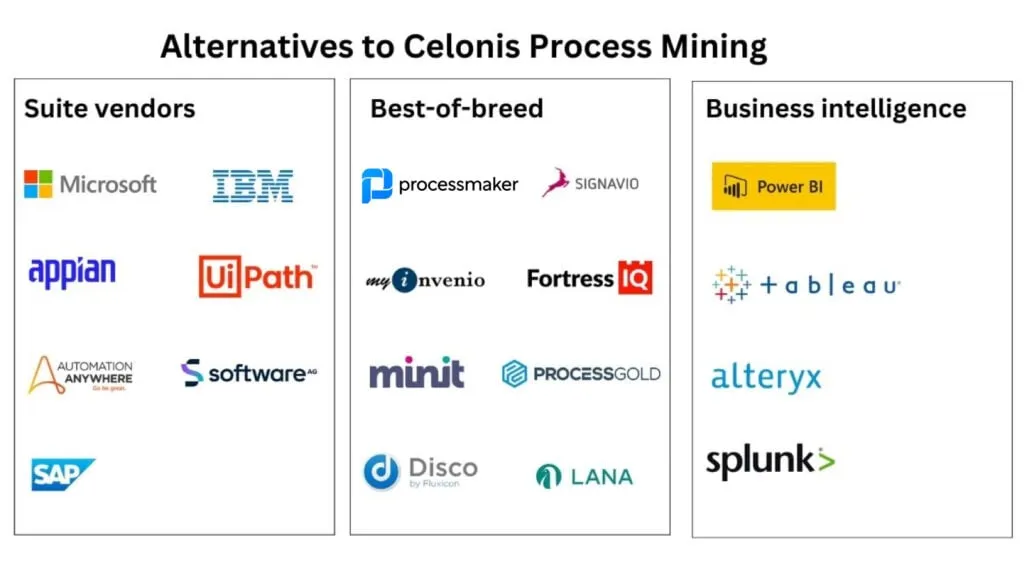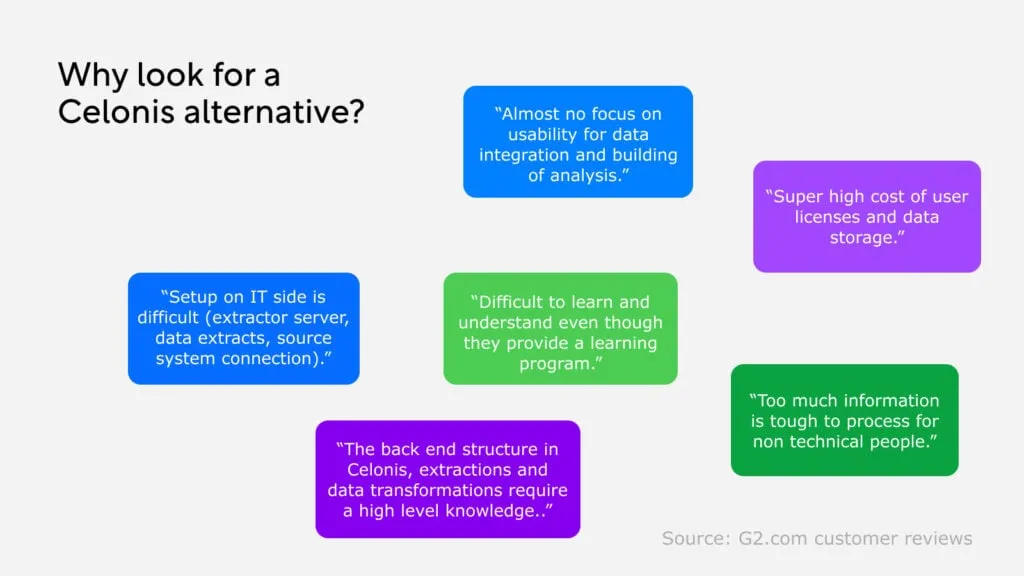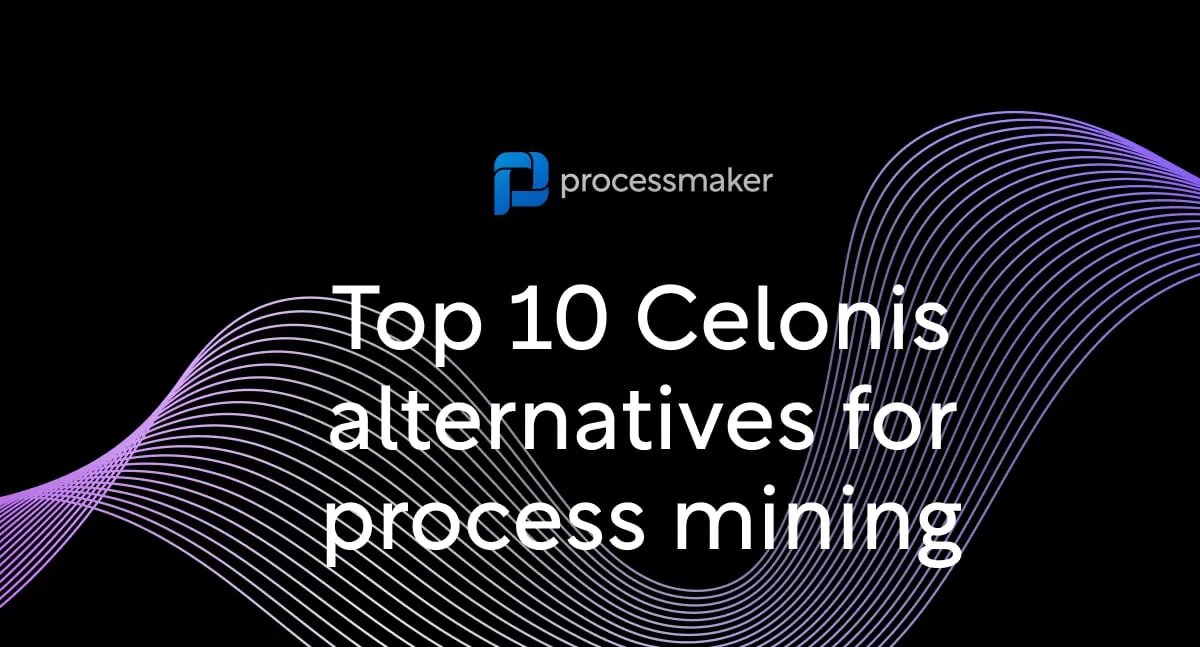Top 10 Celonis competitors and alternatives
Blog: Blog | ProcessMaker
Celonis is a market leader in process mining, but it’s not the only alternative available in the market. In this article we go through the top ten competitors you can compare to find your ideal process mining solution.

Is Celonis right for your business?
Celonis is a popular software solution that helps enterprise organizations optimize their business processes. For many people, Celonis is synonymous with process mining software. The company was founded in 2011 and has been one of the first commercially available solutions in the market.
The different Celonis solutions are packed into the Execution Management System (EMS) – a platform that helps businesses analyze and visualize processes, identify bottlenecks and inefficiencies, and provide guidance on process improvements.
Key features of Celonis:
- Focus on enterprise businesses: Celonis provides a high level of service, security, and data management for the needs of large enterprise organizations.
- Event log mining: Celonis has a large customer base and broad experience in extracting event logs from different source systems, especially popular ERPs such as SAP and Oracle.
- Wide partner network: Celonis has around 250 partner agencies that provide implementation consulting services.
Who are the top Celonis competitors in 2024?
There are over 30 process mining software solutions available in the market today, so if you’re looking for a Celonis alternative you’ve got plenty of options to choose from. If you’re simply looking to know who are the largest and most established competitors, a good place to look is recent tier analyst reports.
In Gartner Peer Insights for the last 12 months (as of August 2024), the top competitors to Celonis were ABBYY Timeline, Software AG, UIPath, iGrafX, Apromore, IBM, SAP, Microsoft, Mindzie, and Appian.
You can find key features of all these Celonis competitors later in this guide.
Why look for a Celonis alternative?
While Celonis is a popular option, it is not an ideal fit for every enterprise organization. Some of the common dislikes and challenges mentioned by customers in peer review sites such as G2.com include:
- Difficulty to implement – Celonis process mining requires integrations to every different source system to extract event logs. There are many business applications that don’t have event logs available and some organizations simply have many different applications to track – leading to significant data integration hassle.
- High cost to implement – Celonis is a robust process mining solution, but it is known for requiring significant costs to implement. Customer reviews mention the long contract length (typically 3 years) as well as the indirect costs involved in hiring data scientists and process analysts.
- Complex user interface – while Celonis offers many advanced features for experienced process analysts and data scientists, some users find the user experience complicated and challenging to learn.

Our Top Celonis Alternatives List
1. ProcessMaker Process Intelligence
ProcessMaker is a new entrant to the process intelligence space. It is the first hybrid solution that combines process mining and task mining into one natively integrated AI-powered platform.
Typically enterprise business customers uncover ~20% savings within 30 days of plug-and-play installation of ProcessMaker’s Process intelligence (PI) solution.
Depending on your resources and needs ProcessMaker PI can augment or replace Celonis use cases. For example, ProcessMaker PI customers use Celonis for SAP-focused core process mining and leverage PI’s speed and flexibility for finance or procurement process analysis across different business applications.
Key features of Workfellow
- Effortless implementation: ProcessMaker PI does not require access to event logs, instead it generates event logs automatically through a graphic interface. See the whitepaper to learn how the technology works.
- 360-degree analysis: ProcessMaker PI is able to track tasks and process flows across different business apps, allowing for end-to-end analysis of workflows.
- Automated insights: The software has ready-made dashboards and provides automated insights within its analytics.
- Privacy first: ProcessMaker PI is a GDPR-compliant solution that does not process personally identifiable data.
Who is it for?
ProcessMaker PI is a good option for any organization that doesn’t have extensive data science and process mining resources in-house looking for an effortless and fast way to gain process intelligence without data mining hassle.
2. UiPath Process Mining
UiPath is a major process automation and orchestration platform. It provides a suite of tools to help automate processes, including an easy-to-use visual workflow designer, a powerful robotic automation platform, and an AI-powered document understanding component.
UiPath is a pioneer in robotic process automation originally founded in Bucharest, Romania and now headquartered in New York. It is used by over 10,000 customers ranging from independent developers to large enterprise businesses such as Verizon, Takeda Pharmaceuticals. UiPath’s process mining solution has been developed based on the acquisition of ProcessGold in 2019.
Key features of UiPath
- Automation suite: All-in-one platform for automation including RPA, low-code app development, and integrations.
- Accessible and scalable: UiPath is relatively quick to start to use, starting from the free-to-try UiPath Cloud Platform.
- Training: Broad set of training materials for intelligent automation, including the UiPath Academy and certifications
Who is it for?
UiPath is well suited for an enterprise with a strong focus on RPA looking to advance its intelligent automation through a single-suite platform.
3. SAP Signavio
For organizations with an SAP ERP landscape, Signavio is a process discovery and mining solution to consider. In the past, you may have been more familiar with SAP’s Intelligent Business Process Management Solution or the integration of Celonis Process Mining within the SAP solution. SAP acquired Signavio in 2021 and has worked on integrating Signavio as a prime process intelligent offering.
SAP Signavio’s Process Transformation suite can be used for a variety of purposes, including process insights, process automation, process management, and process modeling.
Key features of SAP Signavio
- Integration to SAP. Signavio has deepened integrations to the SAP data ecosystem and partner network.
- Process management. In addition to process mining Signavio offers broader process design and management capabilities-
- Collaboration Hub. Signavio includes unique functionality to share process models, which is especially helpful in creating the should-be state of processes.
Who is it for?
SAP Signavio is especially valuable for enterprises looking to implement a broad business process management (BPM) approach on the SAP data stack.
4. IBM Process Mining
If you’re a believer in “you won’t get fired for buying IBM,” you’ll be glad to know that Big Blue offers its own process discovery and intelligence solution. Added to IBM’s portfolio in 2021 through an acquisition of MyInvenio, IBM Process Mining discovers, monitors, and optimizes business processes by extracting system data from enterprise systems.
Key features of IBM Process Mining
- Easy to use. IBM Process Mining has advanced process enhancement features that discover business rules based on event log data and add them to a standard BPMN model.
- Visualizations. IBM Process Mining offers a variety of visualization options relevant to process discovery, including process graphs, process variants, and conformance analysis.
- Process simulation. IBM Process Mining has simulation features enabling to-be processes and what-if scenarios.
Who is it for?
IBM Process Mining is a good option for companies looking to build on IBM’s data and consulting expertise, especially with an interest in aligning business process management and design models with standard practices, such as BPMN models.
5. Automation Anywhere / FortressIQ
Automation Anywhere is a major enterprise automation suite founded in 2003. Its process discovery and mining solution was integrated into the Automation Success Platform through the acquisition of FortressIQ in 2021.
Automation Anywhere is used extensively by large enterprise organizations across different geographies. It is especially known for combining elements of robotic process automation (RPA) and artificial intelligence (AI) to enable end-to-end automation of business processes.
Key Features of FortressIQ / AA Process Mining
- Integration to automation suite: FortressIQ is now embedded into Automation Anywhere’s intelligent automation offering.
- Task capture: FortressIQ leverages computer vision to capture screen activity for task mining and process discovery.
- Large enterprise client list: both FortressIQ and Automation Anywhere have an impressive list of enterprise clients.
Who is it for?
FortressIQ initially gained traction with contact centers serving North American clients. It is a potential option for automation-focused enterprises in regions where task capture and personal data privacy are less of an issue.
6. SoftwareAG / Aris Process Mining
Aris Process Mining is a solution developed by Software AG, an enterprise software vendor founded in Darmstadt, Germany in 1969. Software AG has over 10,000 enterprise customers in over 70 countries.
Aris Process Mining was one of the first commercial process mining tools originating in 2000. Its core advantage is deep integration with business process modeling and enterprise architecture design.
Key Features of Software AG / Aris Process Mining
- Interactive root-cause analysis: Aris Process Mining includes unique automated root-cause mining and insights.
- Process modeling: process models can be enhanced by real performance measures.
- Process Performance Management (PPM): a tool to manage business processes based on process mining and analytics insights.
Who is it for?
Customers find value in Software AG’s broad ecosystem of solutions and partners across various geographies.
7. ABBYY Timeline
ABBYY Timeline can be broken down into three steps: recording, analysis, and recommendations. The scalable and nonintrusive technology captures variations in how tasks are performed over a large period of time to enable large teams of desktop users to see variations in user interaction paths.
ABBYY Timeline also protects privacy with OCR technology that removes sensitive information. After gathering and analyzing information, the technology recommends tasks for automation based on length of time, repetition, and complexity. By doing this, ABBYY Timeline helps organizations scale high-value automation and build transformation plans.
With ABBYY’s task mining technology, users can identify:
- Tasks worth automating,
- Possible tasks to automate,
- Effect of automation on processes,
- Tasks that waste time,
- The best set of tasks necessary to complete work.
8. Mehrwerk Process Mining
Mehrwerk is a process mining solution built on the Qlik Sense business intelligence platform. It offers comprehensive process mining capabilities and combines self-service functionality process-visualizations
Key functionalities of Mehrwerk ProcessMining (MPM):
- Business intelligence integration: MPM is integrated into Qlik Sense for modern business intelligence visualizations.
- Self-service analytics: flexibility of dashboards with the ability to create and modify charts.
- Data extraction: over 100 connectors leveraging the ETL functionality offered by Qlik.
Who is it for?
Mehrwerk is ideally suited for business process analysts who prefer to build their solution with a deep integration to a well-established Qliktech business intelligence solution.
9. Apromore
Apromore is a process mining solution with deep links to the academic sector founded by university professors. Apromore offers a free version of its software for education and research purposes.
Key features of Apromore Process Mining:
- Free version: Apromore offers access to its Enterprise Edition SaaS product free of charge for students and researchers.
- Salesforce integration: Apromore has received funding from Salesforce and is an official partner of Salesforce.
- Academic connections: Apromore has strong connections to academia, including the University of Melbourne.
Who is it for?
Appian is especially strong in the North American region and could be a good fit for large enterprise service companies.
10. Do-it-yourself eg. PowerBI / Tableau / Splunk / Alteryx
While Celonis has many best-of-breed and process automation suite competitors, a final natural alternative is build-it-yourself process mining.
Here is a summary of the popular alternatives in the business intelligence space.
Celonis vs Power BI
The main difference between Power BI and Celonis lies in their purpose and focus. Power BI is a general-purpose business intelligence tool that helps users analyze and visualize data from various sources. It’s suitable for businesses looking to create dashboards, reports, and data visualizations to support decision-making.
Celonis, on the other hand, focuses specifically on process mining and optimization. It is designed for organizations that want to gain insights into their operational processes, identify bottlenecks, and improve efficiency.
Both Power BI and Celonis support data integration from multiple sources. Power BI offers a wide range of connectors to various databases, cloud services, and file formats. Celonis, while also supporting multiple data sources, primarily focuses on integrating data from enterprise systems like ERP, CRM, and supply chain management.
While both tools offer data visualization capabilities, Power BI provides a richer set of options for creating interactive and customizable dashboards and reports. Celonis focuses more on process visualization, representing process flows and performance indicators in a clear and understandable way.
TL;DR:
Celonis can be considered a process intelligence solution, while PowerBI is a more general visualization and business intelligence tool from Microsoft.
Celonis vs Tableau
Tableau is a data visualization tool that helps users create interactive and shareable dashboards. It is designed for exploring and analyzing data from various sources, making it easier to understand and communicate insights. Celonis, on the other hand, is focused on more closely on process mining and execution management.
Tableau can connect to a wide variety of data sources, including databases, spreadsheets, and cloud-based storage. It allows users to create visualizations, such as charts, graphs, and maps, to represent the data and uncover hidden patterns. For the data ingestion, Celonis mostly uses event logs in enterprise source systems.
Tableau has a broader user base of different types of users, encompassing data analysts, business intelligence professionals, and decision-makers across various industries. Celonis caters to a more specific audience, mainly business process analysts, operations managers, and executives who are looking to optimize their organization’s processes.
TL;DR:
While Tableau offers advanced visualization and business intelligence (BI) solutions, Celonis is more comprehensively focused on process mining and process intelligence.
Celonis vs Splunk
Splunk is a software platform primarily used for log management, monitoring, and analysis. It enables organizations to collect, index, and analyze machine-generated data from various sources, such as applications, servers, and network devices, to gain insights into system performance, security, and operations. In this regard, it can be used for data mining and process intelligence.
Splunk can ingest a wide variety of data formats, including structured, semi-structured, and unstructured data. Its primary function is to index and make this data searchable, enabling users to run real-time or historical searches, generate reports, and create alerts based on specific conditions. In this aspect, it works similarly to Celonis in event log data mining.
Splunk provides various features for data analysis, such as search processing language (SPL), data visualization, alerting, reporting, and machine learning capabilities to support anomaly detection, forecasting, and clustering. There are use cases where Splunk can match the use cases of process mining vendors like Celonis eg. in conformance monitoring.
Splunk is mainly targeted at IT operations, security, and DevOps teams who need to monitor and analyze system performance, troubleshoot issues, and detect security threats or anomalies. Its use cases are in this way not directly comparable to Celonis in the business process management space.
TL;DR:
Splunk is a broadly used data mining and monitoring tool, while Celonis is more narrowly focused on enterprise process management.
Celonis vs Alteryx
Alteryx is an end-to-end data analytics platform that focuses on data preparation, blending, and advanced analytics. It allows users to clean, transform, and enrich data from various sources, making it suitable for analysis, reporting, and visualization. In this set of features, it can be compared to Celonis.
Alteryx supports a wide range of data formats and sources, including databases, spreadsheets, cloud-based storage, and big data platforms. It provides a drag-and-drop interface for data preparation tasks, such as filtering, joining, and aggregating data. Celonis also provides a comprehensive way for integrating and extracting process data, but it generally involves event log data mining.
Alteryx targets a broad audience, including data analysts, business intelligence professionals, and decision-makers across various industries who need to prepare and analyze data for generating insights. In this way, you can view it as a broader toolkit for advanced data science and analytics automation than Celonis, which focuses more closely on the needs of business process management professionals.
TL;DR:
Alteryx enables automated data science and analytics while Celonis is more narrowly focused on enterprise process management.
Intelligent Automation Q&A:
- What does Celonis do?
Celonis specializes in process mining, which is a data-driven technique used to discover, monitor, and improve real-world business processes. By analyzing event logs generated by IT systems, Celonis provides insights into how processes are actually being executed, highlighting bottlenecks, inefficiencies, and deviations from the ideal process flow. This enables organizations to optimize their processes, reduce costs, and improve overall operational efficiency. In addition to process mining, Celonis also offers tools for process automation and workflow management, helping businesses streamline their operations and achieve better results.
- Is Celonis an ETL tool?
Celonis is not an ETL (Extract, Transform, Load) tool, as its primary focus is on process mining and business process management. ETL tools are designed to extract, transform, and load data from different sources into a central repository or data warehouse, enabling organizations to store, manage, and analyze large volumes of data. While Celonis does have some data extraction and transformation capabilities, its main purpose is to analyze and optimize business processes.
- Is Celonis owned by SAP?
Celonis is not owned by SAP. In the early days of the company in 2012 Celonis participated in the SAP Startup Focus program and has held reseller and partner agreements with SAP, but they are today independent companies.
- What are the competitors to Celonis?
The main competitors of Celonis include UiPath, Minit, ProcessGold (acquired by UiPath), Signavio (part of the SAP Business Process Intelligence suite), and QPR Software. These companies offer various process mining and BPM solutions designed to analyze, optimize, and automate business processes, helping organizations identify areas for improvement and drive efficiency.
The post Top 10 Celonis competitors and alternatives appeared first on ProcessMaker.
